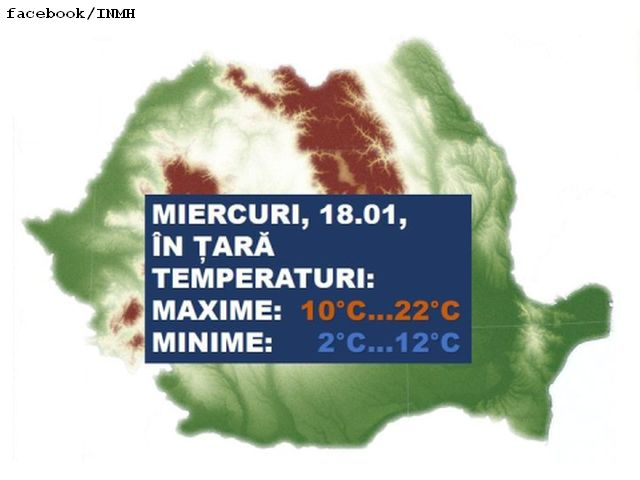Springtime in January
Wednesday was a historical day for Romania with record high temperatures registered by several weather stations across the country

Mihai Pelin, 19.01.2023, 14:00
Although in full winter season, the weather in
Romania is actually spring weather. We’ve had the warmest Christmas in the past
50 years and the first days of 2023 brought extremely warm temperatures in many
regions across the country.
The National Meteorological Agency has also
announced a new record high temperature, 22.4 degrees Celsius in Turnu
Magurele, southern Romania, when January 18th was the warmest of
this month in recorded history. The previous record high belonged to Oravita,
in south-western Romania, which saw its highest temperature, 22.2 degrees, on
January 7th 2001. Bucharest had its highest January temperature, 18
degrees Celsius back in 2002.
The weather is going to get
cooler in Romania starting Friday with precipitations, which are even going to
turn into snow and sleet in the mountains and some regions in the country’s
west, center and north-east. Even so, the weather is still warmer than usual
for this time of the year and according to meteorologists, the year 2022 was
the warmest in recorded history with an average annual temperature of 11.7
degrees Celsius. The unusually high temperatures this month have created a lot
of problems to farmers as extreme drought has been forecast for the southern
regions while in the north trees are expected to sprout and then freeze. The
wheat, rape and barley crops haven’t been affected but the trees are expected
to bear the brunt of the latest extremely high temperatures as their fruit are
going to be compromised if temperatures drop significantly.
Winters have become increasingly warm, snowfalls have
been replaced by rain and the present global warming has a tendency to deepen. 2022 was the fifth warmest in
Romania since 1880, when weather reports have been consistently made. According
to US experts, global temperatures are getting higher and higher while extreme
weather phenomena have become more frequent.
The world’s average temperature is now 1.1, 1.2 degrees
higher than in the pre-industrial era and will continue to rise, unless
humankind gives ups the use of fossil fuel. Climate change has caused extreme
weather phenomena all over the world in 2022. Europe was in for its hottest
summer in history, while floods killed 17 hundred people in Pakistan and caused
damage to the infrastructure. Drought devastated crops in Uganda and wildfires
wreaked havoc on the Mediterranean countries.
(bill)






























